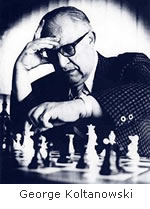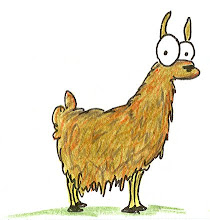GM George Koltanowski, the legendary grandmaster of chess who wrote more than 19,000 chess columns for The San Francisco Chronicle with the same ease with which he dispatched countless opponents in a career that spanned 10 decades, died Saturday in a San Francisco hospital after a brief illness. He was 96.
Mr. Koltanowski, a gentleman of the Old World who made the world's most difficult game look easy, enjoyed introducing newcomers and children to chess as much as he enjoyed playing it.
His column, which appeared in The Chronicle every day without interruption for 52 years, was the longest-running daily chess column in history.
``Chess is an international language,'' he once said. ``Everyone in the world can understand it, appreciate it and enjoy it.''
Few, however, could understand the game as well as Mr. Koltanowski. He was an international grandmaster, one of only 200 in the world, and the former chess champion of his native Belgium.
He was also the world champion of a form of the game known as blindfold chess, in which the player commits the game to memory and does not look at the board or touch the pieces used by opponents, who play in the normal fashion. Mr. Koltanowski's 1937 feat of playing 34 opponents simultaneously while blindfolded without losing a game has never been equaled.
Known as Kolty to his legions of friends and fans, Mr. Koltanowski not only lived and breathed the game, but also cherished and enhanced it. He wrote chess books, conducted chess tournaments, coached chess players, wore chess neckties, told endless chess stories and turned the lights on and off in his Cathedral Hill apartment with chess-styled switch plates.
He preferred the brand of scotch that came in purple cloth sacks -- not because he liked that brand but because the bags could be used later to hold chess pieces.
A native of Antwerp, Mr. Koltanowski learned the game while watching his father play his older brother. He took up the game seriously at the age of 14. Three years later, he was champion of Belgium and soon gave up a fledgling career as a diamond cutter to play full time.
He competed in scores of tournaments in the 1920s, 1930s and 1940s, holding his own against the top players of the day, including former world champions Alexander Alekhine and Max Euwe, his good friend.
He served a short stint in the Belgian army, where his primary duty, he recalled with a characteristic grin, was the peeling of potatoes. While he peeled away absent-mindedly, he studied chess positions.
``Soldiers were going hungry,'' he said, ``because I was peeling the potatoes into smaller and smaller cubes.''
He even credited the game of chess with saving his life. When the Nazis overran Belgium during World War II and several of his family members perished in the Holocaust, Mr. Koltanowski was on a chess tour of Central America. He was allowed to immigrate to the United States only because a chess- playing consul in Cuba had been amazed by one of Mr. Koltanowski's demonstrations.
He came to New York City, where he met his wife, Leah, on a blind date in 1944. They moved to the Bay Area in 1947.
The following year, he began writing his daily chess column in The Chronicle. It also appeared as a syndicated feature in other papers.
``George Koltanowski was a legendary member of the Chronicle family,'' said  Managing Editor Jerry Roberts. ``He was a great chess player, an outstanding journalist, a true gentleman, and he could beat any other newspaper's chess columnist with his eyes closed.''
Every day, Mr. Koltanowski would offer readers a chess problem or puzzle and relate the moves of a recently played tournament game, along with his comments on the moves and perhaps an amusing anecdote. His chess maxims were as funny as they were profound.
``Pawns are like buttons,'' he was fond of saying. ``Lose too many and the pants fall down by themselves.''
He was assisted in every aspect of his career by Leah Koltanowski for more than 50 years, although she does not play chess and never wanted to learn.
``George is the grandmaster,'' she said. ``If he taught me the game, I'd be just another chess player.''
Managing Editor Jerry Roberts. ``He was a great chess player, an outstanding journalist, a true gentleman, and he could beat any other newspaper's chess columnist with his eyes closed.''
Every day, Mr. Koltanowski would offer readers a chess problem or puzzle and relate the moves of a recently played tournament game, along with his comments on the moves and perhaps an amusing anecdote. His chess maxims were as funny as they were profound.
``Pawns are like buttons,'' he was fond of saying. ``Lose too many and the pants fall down by themselves.''
He was assisted in every aspect of his career by Leah Koltanowski for more than 50 years, although she does not play chess and never wanted to learn.
``George is the grandmaster,'' she said. ``If he taught me the game, I'd be just another chess player.''
 Managing Editor Jerry Roberts. ``He was a great chess player, an outstanding journalist, a true gentleman, and he could beat any other newspaper's chess columnist with his eyes closed.''
Every day, Mr. Koltanowski would offer readers a chess problem or puzzle and relate the moves of a recently played tournament game, along with his comments on the moves and perhaps an amusing anecdote. His chess maxims were as funny as they were profound.
``Pawns are like buttons,'' he was fond of saying. ``Lose too many and the pants fall down by themselves.''
He was assisted in every aspect of his career by Leah Koltanowski for more than 50 years, although she does not play chess and never wanted to learn.
``George is the grandmaster,'' she said. ``If he taught me the game, I'd be just another chess player.''
Managing Editor Jerry Roberts. ``He was a great chess player, an outstanding journalist, a true gentleman, and he could beat any other newspaper's chess columnist with his eyes closed.''
Every day, Mr. Koltanowski would offer readers a chess problem or puzzle and relate the moves of a recently played tournament game, along with his comments on the moves and perhaps an amusing anecdote. His chess maxims were as funny as they were profound.
``Pawns are like buttons,'' he was fond of saying. ``Lose too many and the pants fall down by themselves.''
He was assisted in every aspect of his career by Leah Koltanowski for more than 50 years, although she does not play chess and never wanted to learn.
``George is the grandmaster,'' she said. ``If he taught me the game, I'd be just another chess player.'' 










No comments:
Post a Comment